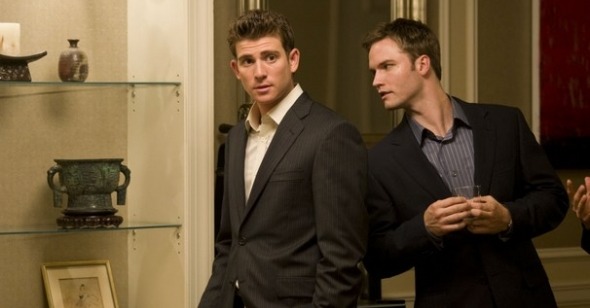Cash Poor
by Michael Koresky
The Good Guy
Dir. Julio DePietro, U.S., Roadside Attractions
Whatever suspense Julio DePietro‚Äôs The Good Guy seems to think it‚Äôs generating is predicated upon the supposedly surprising twist that its central Wall Street wannabe tycoon is not, in fact, a standup guy. Though all of the details of his cretinous behavior come as a slap in the face to the film‚Äôs central looking-for-love character, Beth (Alexis Bledel), it‚Äôs doubtful they‚Äôll pull the rug out from under any viewer who may have previously seen a film about hotshot traders fast-talking whilst pressing a phone to each ear‚ÄĒor indeed anyone who may have previously seen a film. The bullish dude in question (who‚Äôs decidedly not the ‚Äúgood guy‚ÄĚ of the title) is Tommy (Scott Porter), whose adorable overbite and gym-toned torso conceal a sexually dissatisfied, little lost boy who underhandedly takes his professional aggression out on women and coworkers.
Though Tommy‚Äôs loutishness is clear from the beginning (thanks, perhaps, to something in Porter‚Äôs blank stare, which convincingly reeks of privilege and which, for desperate lack of a better analogy, can be called Mark-Paul Gosselaar-esque), the film devises a pointless flashback structure and a misguided, puzzlingly intermittent voice-over from Tommy to lead us off the scent. First seen sorrowful and seemingly repentant in the rain, begging for understanding from a blase, unmoved Beth, Tommy is at first The Good Guy‚Äės nominal protagonist. After all, the likeability factor is relative, depending on who‚Äôs watching; those who get off on watching cameras whip and rush around investment bankers‚Äô offices while hot-tempered guys bark and cajole each other might find themselves on Tommy‚Äôs side, especially when he finds himself dressed down by his swaggering, nut-munching boss, played by an appropriately supercilious Andrew McCarthy, reduced to shouting things like, ‚ÄúWhere the fuck is my latte?!‚ÄĚ Meanwhile, Beth, a good-hearted urban conservationist (her profession naturally placed in complete contrast to Tommy‚Äôs), has doubts, but besides the occasional book club party, also seems to have few interests other than finding the right man to settle down with.
Enter Bryan Greenberg‚Äôs Daniel, Tommy‚Äôs new protege who‚Äôs clearly not cut from the same cloth as the rest of the sexist scamps at the office. A former ROTC grad with limited bullshitting skills and an alarming inability to tell dirty jokes, Daniel is a slime-free fish out of water. Soon enough, Tommy is giving the inoffensively handsome Daniel an attitudinal and wardrobe makeover, which only makes him more confident when he finds himself attracted to Beth, who in turn finds his reserved non-piggish behavior so charming that she invites him to her heretofore ladies-only reading group. Inhabiting the same basic role as did Hugh Dancy in The Jane Austen Book Club (a comparison that would make many of the characters in The Good Guy queasy), Greenberg sits on Beth‚Äôs couch with his knees pressed childishly close together as he awkwardly spouts meta pearls of wisdom about Lolita like, ‚ÄúYou can‚Äôt trust the narrator‚Ķ it‚Äôs like real life.‚ÄĚ
If The Good Guy is thus reflective of real life, it‚Äôs a reality in which posters shouting ‚ÄúBeware of sharks!‚ÄĚ show up at bookstores (in center frame) as warnings to wayward girls. ‚ÄúIt feels like a war zone here sometimes,‚ÄĚ a character at one point opines about dating in New York City, but as depicted in DePietro‚Äôs sparkling, spacious Manhattan apartments inhabited by heedless money men, it seems more like a joyride, however joyless.
This article originally appeared on indieWIRE.
